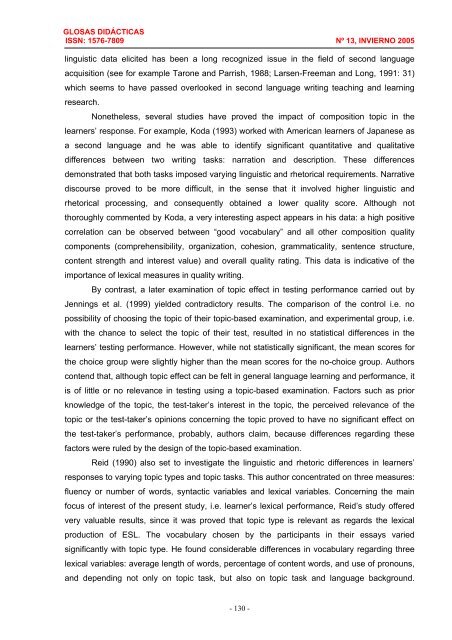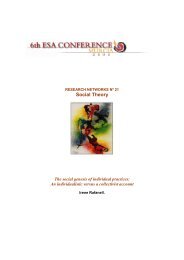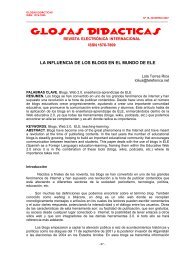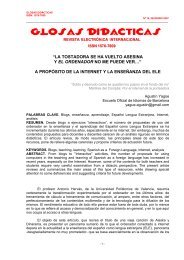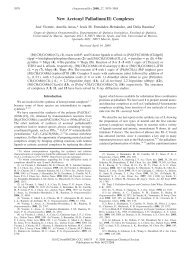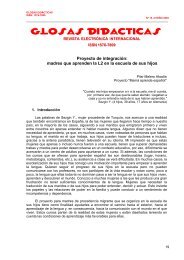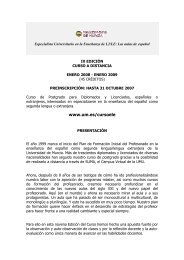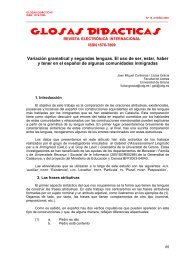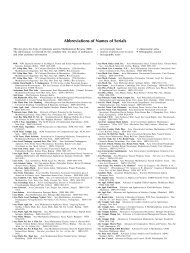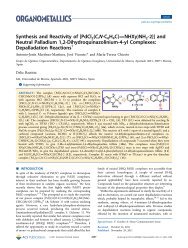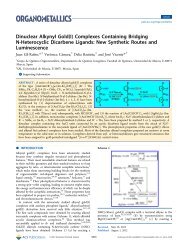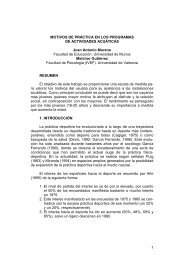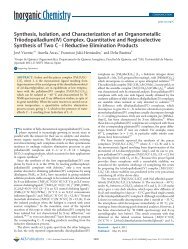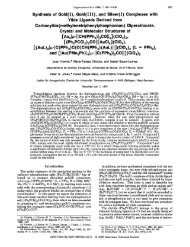descarga del número 13 de glosas didácticas completo
descarga del número 13 de glosas didácticas completo
descarga del número 13 de glosas didácticas completo
Create successful ePaper yourself
Turn your PDF publications into a flip-book with our unique Google optimized e-Paper software.
GLOSAS DIDÁCTICAS<br />
ISSN: 1576-7809 Nº <strong>13</strong>, INVIERNO 2005<br />
linguistic data elicited has been a long recognized issue in the field of second language<br />
acquisition (see for example Tarone and Parrish, 1988; Larsen-Freeman and Long, 1991: 31)<br />
which seems to have passed overlooked in second language writing teaching and learning<br />
research.<br />
Nonetheless, several studies have proved the impact of composition topic in the<br />
learners’ response. For example, Koda (1993) worked with American learners of Japanese as<br />
a second language and he was able to i<strong>de</strong>ntify significant quantitative and qualitative<br />
differences between two writing tasks: narration and <strong>de</strong>scription. These differences<br />
<strong>de</strong>monstrated that both tasks imposed varying linguistic and rhetorical requirements. Narrative<br />
discourse proved to be more difficult, in the sense that it involved higher linguistic and<br />
rhetorical processing, and consequently obtained a lower quality score. Although not<br />
thoroughly commented by Koda, a very interesting aspect appears in his data: a high positive<br />
correlation can be observed between “good vocabulary” and all other composition quality<br />
components (comprehensibility, organization, cohesion, grammaticality, sentence structure,<br />
content strength and interest value) and overall quality rating. This data is indicative of the<br />
importance of lexical measures in quality writing.<br />
By contrast, a later examination of topic effect in testing performance carried out by<br />
Jennings et al. (1999) yiel<strong>de</strong>d contradictory results. The comparison of the control i.e. no<br />
possibility of choosing the topic of their topic-based examination, and experimental group, i.e.<br />
with the chance to select the topic of their test, resulted in no statistical differences in the<br />
learners’ testing performance. However, while not statistically significant, the mean scores for<br />
the choice group were slightly higher than the mean scores for the no-choice group. Authors<br />
contend that, although topic effect can be felt in general language learning and performance, it<br />
is of little or no relevance in testing using a topic-based examination. Factors such as prior<br />
knowledge of the topic, the test-taker’s interest in the topic, the perceived relevance of the<br />
topic or the test-taker’s opinions concerning the topic proved to have no significant effect on<br />
the test-taker’s performance, probably, authors claim, because differences regarding these<br />
factors were ruled by the <strong>de</strong>sign of the topic-based examination.<br />
Reid (1990) also set to investigate the linguistic and rhetoric differences in learners’<br />
responses to varying topic types and topic tasks. This author concentrated on three measures:<br />
fluency or number of words, syntactic variables and lexical variables. Concerning the main<br />
focus of interest of the present study, i.e. learner’s lexical performance, Reid’s study offered<br />
very valuable results, since it was proved that topic type is relevant as regards the lexical<br />
production of ESL. The vocabulary chosen by the participants in their essays varied<br />
significantly with topic type. He found consi<strong>de</strong>rable differences in vocabulary regarding three<br />
lexical variables: average length of words, percentage of content words, and use of pronouns,<br />
and <strong>de</strong>pending not only on topic task, but also on topic task and language background.<br />
- <strong>13</strong>0 -


